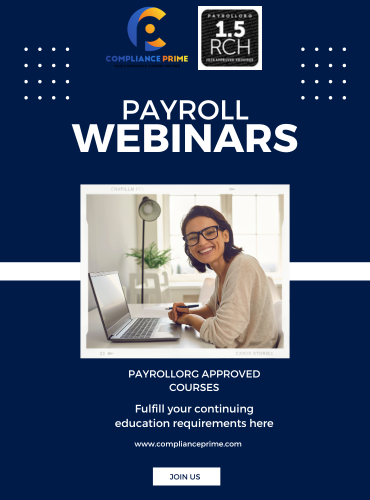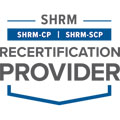
In this webinar we will discuss what can and what cannot be deducted from an employee’s regular paycheck as well as their final one. Failure to follow the regulations pertaining to employee wage deductions can result in substantial penalties and interest.
Background:
In payroll we calculate the gross wages of an employee by meticulously following strict regulations on what must be or must not be counted as hours worked and taxable income. We pay the employee their net paycheck only by the payment method that is permitted. But what about in between? When it comes to deducting from the employee’s gross wages to achieve the net income are you also adhering strictly to the rules? After calculating gross wages for an employee is accomplished, much more difficult decisions must be made. What must an employer deduct from an employee’s wages? What can be deducted legally? What can never be deducted? These questions and more must be answered correctly before processing that paycheck. And if this is the employee’s final check…the rules may change! Handling deductions is a complex task that payroll must get right every time for every payroll check. Failure to deduct the proper taxes could result in penalties on the employer from the IRS but making an illegal deduction for a fringe benefit or for collecting an overpayment can get the employer a visit from the federal Department of Labor auditor, the state department of labor auditor or both! Sometimes the federal government will allow the deduction but that certain state won’t. Of course, everyone knows that payroll deducts for federal and state taxes. However, how much input does the employee have concerning these deductions? This will be answered in this webinar. Which taxes are mandatory, which are a courtesy and which ones the employee controls will be explained during this webinar. If the IRS or the state wants payroll to collect for back taxes; how is that processed? What does payroll do if a “payday loan” deduction is received as opposed to a creditor garnishment? Which ones must we honor and why. We will discuss this during this webinar.
Fringe benefits are a normal part of payroll for most employees. Deducting for voluntary fringe benefits such as health insurance or group term life can usually be an easy task. But what about health insurance under a medical support order? Does that change how it is processed by payroll? We will discuss processing voluntary and involuntary health insurance deductions. Many employers require their employees to wear uniforms for work. Can the cost of the uniforms and their upkeep be deducted from an employee’s wages? What about cash shortages or breakage? Can I deduct the cost of shortage or breakage from the employee’s paycheck under the state or federal laws?
Some employers offer meals and lodging as part of the employee’s work contract. What can be deducted from the employee’s paycheck for employer provided meals and lodging and can this be used as credit against the minimum wage paid? What if an employee is overpaid? Can the employer simply deduct the overpayment from future payments or does the employee have to agree to the deduction in writing? Does the federal law differ from the state law in this area and, if it does, which one does the employer have to follow? Many employers advance vacation for their employees to ensure that all employees are rested and working at peak efficiency. But what if the employee takes their vacation in advance and then leaves the company? Can an employer recoup advanced vacation hours from the employee’s final check under federal or state laws? Many employers give loans, advances on wages to employees or allow employees to purchase items from the employer. We will discuss how these can be recouped or repaid if the employee stays or if the employee terminates.
Areas covered:
- Taxes—which are mandatory, which are a courtesy, and which ones the employee controls
- Child support—the limits but not beyond
- Tax levies—federal and state
- Creditor garnishments—how many can you honor and how often
- Voluntary wage assignments for “payday loans”—when are they required to be honored
- Handling fringe benefits such as health insurance or group term life
- Uniforms—when the employer pays for it and when the employee furnishes it
- Meals—when they become part of the employee’s wages
- Lodging—when it is part of the employee’s wages and when is it a perk
- Shortages—the employee came up short, so they must cover that right?
- Breakage—you broke it, so you have to pay for it, legal or not?
- Overpayments—the employee was overpaid so you can just take the money back, or can you?
- Advanced vacation pay—the employee knows the vacation hours were advanced so we can take them back when the employee quits can’t we?
- Loans to employees: what terms can be set while the employee is still active and what can be taken when the employee terminates
- Employee purchases—active employees and terminated employees
- Anti-wage theft laws and the states.
Who Should Attend:
- Payroll Executives/Managers/Administrators/Professionals/Practitioners/Entry Level Personnel
- Human Resources Executives/Managers/Administrators
- Accounting Personnel
- Business Owners/Executive Officers/Operations and Departmental Managers
- Lawmakers
- Attorneys/Legal Professionals
- Any individual or entity that must deal with the complexities and requirements of paying employees
Vicki M. Lambert, CPP
Vicki M. Lambert, CPP, is President and Academic Director of The Payroll Advisor™, a firm specializing in payroll education and training. The company’s website www.thepayrolladvisor.com offers a payroll news service which keeps payroll professionals up-to-date on the latest rules and regulations. With 40 years of hands-on experience in all facets of payroll functions as well as over three decades as a trainer and author, Ms. Lambert has become the most sought-after and respected voice in the practice and management of payroll issues. She has conducted open market training seminars on payroll issues across the United States that have been attended by executives and professionals from some of the most prestigious firms in business today. A pioneer in electronic and online education, Ms. Lambert produces and presents payroll related audio seminars, webinars and webcasts for clients, APA chapters and business groups throughout the country. Ms. Lambert is an adjunct faculty member at Brandman University in Southern California where she is the instructor for the American Payroll Association’s “PayTrain” online program offered by Brandman University.

The use of this seal confirms that this activity has met HR Certification Institute’s® (HRCI®) criteria for recertification credit pre-approval.
Credits: 1.5
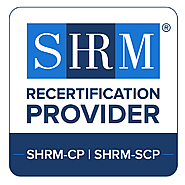
Compliance Prime is recognized by SHRM to offer Professional Development Credits (PDCs) for the SHRM-CPSM or SHRM-SCPSM. This program is valid for PDC(s) for the SHRM-CP or SHRM-SCP. For more information about certification or recertification, please visit www.shrmcertification.org
Credits: 1.5
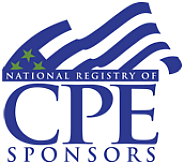
Compliance Prime is registered with the National Association of State Boards of Accountancy (NASBA) as a sponsor of continuing professional education on the National Registry of CPE Sponsors. State boards of accountancy have final authority on the acceptance of individual courses for CPE credit. Complaints regarding registered sponsors may be submitted to the National Registry of CPE Sponsors through its website: https://www.nasbaregistry.org.
Credits: 1.5
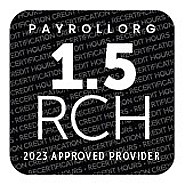
Credits: 1.5
Why You Should Subscribe?

Unlimited Live and On-Demand Courses
Watch all live or recorded webinars (up to 120 minutes long). Get instant access to a library of more than 500 high quality courses presented by best-in-class presenters.

CEUs: PAYROLLORG, CPE, SHRM and HRCI Credits
Fulfil your recertification requirements by earning CEUs from PAYROLLORG, CPE, SHRM and HRCI.

Free Access to Course Materials
Each program comes with Additional Course Materials, which you can download and read anytime.

Additional Discounts
Get flat 20% discount on Premium Product Category like, Long Hour Webinars.
Call Now At
888-527-3477
Email Us At
Similar Events

Sep 28th 2023 @ 01:00 PM ET
Documenting Resident Violations

Aug 16th 2023 @ 01:00 PM ET
Public Housing Rent Calculation, What is the Final Number?

Mar 23rd 2022 @ 01:00 PM ET
Bootcamp for New Managers and Supervisors: Avoid These 7 Mistakes and Be a Better Boss

Jan 20th 2026 @ 01:00 PM ET




